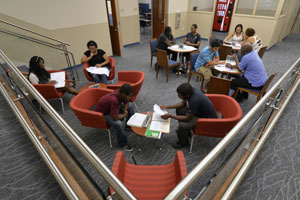The College Chosen to Participate in National Initiative to Bring Education and Training to Incarcerated Individuals Through the Federal Pell Grant Program
(Delaware and Chester Counties, PA • May 4, 2022)—Delaware County Community College has been selected by the U.S. Department of Education to participate in a national initiative that provides education and training to incarcerated individuals. The College is one of an additional 73 institutions nationwide that will take part in the “Second Chance Pell Experiment,” which since 2015 has helped incarcerated individuals gain access to higher education and training. Participating institutions can begin accessing Pell grants as early as July 1.
“Ultimately, this program will provide incarcerated individuals with a pathway to stable, sustainable jobs, which will, in turn, minimize the possibility of recidivism,” says Delaware County Community College President Dr. L. Joy Gates Black.
“The Second Chance Pell grant will provide transformative change to prepare incarcerated individuals with the essential workforce skills and credentials to successfully transition into employment as well as additional pathways,” says Laura Williams, warden of the George Hill Correctional Facility in Glen Mills, one of the College’s partners.
With this third cohort of additional schools, Second Chance Pell now includes 200 institutions chosen to lead the way on this unique initiative, which is expected to fully ramp up in July 2023, when the Department of Education intends to implement legislative changes to allow eligible students in “college-in-prison” programs to access federal Pell grants. The federal Pell program provides need-based grants to low-income undergraduate and certain post-baccalaureate students. Grant amounts are dependent on the student’s expected family contribution; the cost of attendance at the school; the student’s enrollment status (full-time or part-time); and whether the student attends for a full academic year or less.
“Access to high-quality postsecondary education is essential to incarcerated individuals, but for far too long people in prison were left out,” says U.S. Secretary of Education Miguel Cardona. “The expansion of Second Chance Pell and these new pathways out of default are critical steps for incarcerated individuals to be able to access educational opportunities that will provide second chances to build a future.”
To increase participation, the federal government is waiving previous loan defaults that prevented incarcerated individuals from participating. Soon, incarcerated individuals also will be able to consolidate loans, which they were not allowed to do previously. The increase in Pell opportunities is expected to allow the Department of Education and institutions to see how well the experiment is working across a broader, more diverse, geographic range.
In year one of its program, Delaware County Community College plans to partner with the George Hill Correctional Facility to provide education and training for up to 30 incarcerated students in Culinary Arts (food prep, service, and management) and Construction Supervision (construction and building inspection, construction laborer). The College will use what it learns in year one, to expand the program in years two and three possibly to other prisons in Delaware and Chester Counties. The College anticipates serving a total of 100 incarcerated students over three years. Depending on COVID safety and security protocols, classroom and hands-on instruction will be provided, as well as in-person and online academic and career guidance. Students will earn industry recognized certificates, such as certificates in Occupational Safety and Health Administration (OSHA) safety and Cardiopulmonary Resuscitation (CPR) from the American Heart Association. Career fairs will be held to connect incarcerated students with employment in high-priority, high-demand career fields. Upon release from prison, students also may opt to enroll in Delaware County Community College or another higher education institution.
To be eligible for Second Chance Pell, incarcerated individuals must have either a high school diploma or a General Educational Development (GED) high school equivalency credential. Students 19 years of age or older who have not graduated from high school or passed the GED exam will be considered for admission on an individual basis. The College provides remedial courses which are available as part of its broader curriculum.
Nationally, incarcerated students have earned more than 7,000 credentials according to the New York City-based Vera Institute of Justice, a nonprofit, national, research and policy organization. It is estimated that for every dollar spent on correctional education programs, $4 to $5 are saved on three-year, re-incarceration costs, according to the RAND Corporation, a California-based, nonprofit, research and public policy organization, which in 2018 did a study funded by the U.S. Department of Justice.













